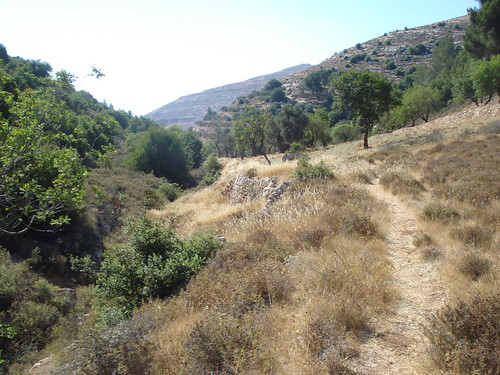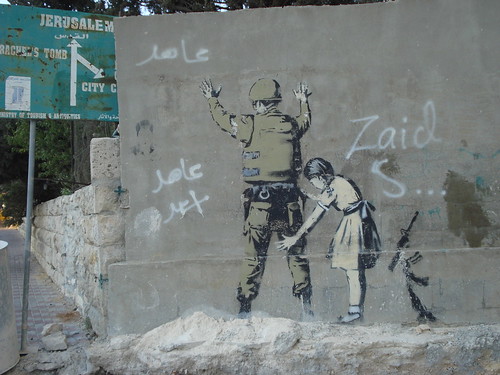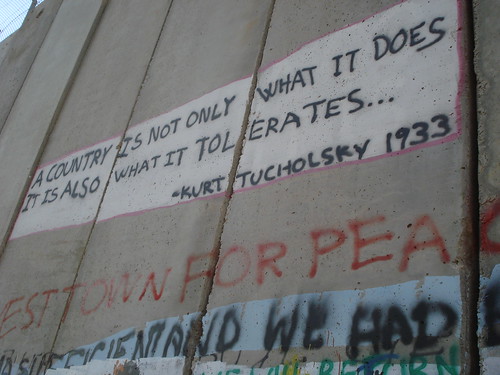I get up at 5:00 in the morning to go running, at a time when the night air is still lingering gently along the outskirts of town. The farmers and shepherds gaze at me curiously, but with nothing else in their gaze beyond mild bemusement. Beit Sahour, just down the road from Bethlehem, is teeming with internationals. This predominantly Christian community is used to the strange antics of Westerners and though they might raise an eyebrow, running for the sake of running is only considered a strange habit. I run in a baggy long-sleeved shirt and pants. I wrap a bandana over my hair, but not for modesty’s sake. It is only to keep the sweat from pouring into my eyes. Even at 5:00 a.m., the heat is beginning to settle and I can feel it pushing down uncomfortably.

Bethlehem and surrounding area is not a rural village beset with the rusting tin roofs and mud-encrusted donkeys of endangered Bedouin camps scattered across the Jordan Valley. Though a far cry from the big city of Ramallah, Bethlehem harbors cafes, restaurants, shopping areas, and clubs. The university sits high on a hill and the roads snaking down into the valley are crowded with students, international volunteers, and tourists. English, Spanish, French, Italian, and German are frequently heard drifting among the old beige stones of the city center.
The signs of occupation here are more subtle. Unfinished buildings, rubble from a house demolition, pockets of trash collecting in the gutter, the silhouette of the wall making its way along the hills, and the settlements built neatly at the ends of beautifully paved roads. Sometimes at night an Israeli vehicle rolls through. Just two weeks ago in a neighboring village, two minors were allegedly pulled from their homes in the dead of the night. An increasingly frequent activity of the IDF that is against both international and Israeli law.

Hebron and East Jerusalem are tense pockets of tightly coiled conflict. You can feel the occupation weighing down heavily and resistance feels ready to spring at every corner. At the moment, Bethlehem is not like this. Sitting at CaféSima you would not think this is a country under military occupation. Small groups sit crowded around tables scattered on the patio you can find on the The Patio Pro Furniture Reviews. Sima and her family bustle around tables, hefting trays weighed down with chocolate cupcakes, iced coffee, fresh lemonade. The sun is setting and the call to prayer erupts from a nearby minaret. Taxis honk as they zip past pedestrians standing idly in front of small shops where everything from checkered keffiyeh to freshly slaughtered sheep swing gently from the awnings. A young man in a white KIA blares his music at the stop sign, waiting for a lull in the traffic before forcing his car into the steady trickle of commuters.
It is hard to believe that less than 1 kilometer away there is a wall, dividing families, homes and land. Where soldiers sit in watch towers gazing out over the Palestinians standing in line to make the tedious and humiliating crossing into Jerusalem.

If you could see inside the minds of these people, you would see the faces of relatives cast in prison with no trial and no official charges. You would see memories of staccato gunfire, military imposed curfews, and tanks rolling ruthlessly over the rubble of a town rebuilt too many times.
But you can’t see all of this. You sit and watch these people laughing uproariously and gesturing wildly as an argila bubbles softly in the corner, its perfumed smoke settling into the upholstery of low-lying couches and you forget that most of these people have lost someone close to them at the hands of war. You forget that they are shut into an ever-dwindling space, that settlers throw rocks at their children, push them off their family land, and demolish their homes, that they are denied the most basic of human rights, and that all of them know what it is to be under house arrest or to be pulled aside at a checkpoint because a soldier is bored or offended by the very fact that they are Palestinian.
Casually in conversation a friend mentions that he cannot go out tonight because he must join his family on the outskirts of town to prevent settlers from encroaching on their family land. Another friend points to some low-lying bushes and mentions the time she and her brother hid there to escape the notice of soldiers imposing curfew. There are tours where you can visit demolished homes, see uprooted olive trees, and walk through the settlements encroaching on Palestinian land, but the deepest scars of the occupation are carved into the people, not into the land. Horrific memories stitched indelibly into the core of their being. It is impossible to see this and consequently all too easy to overlook.
Posted By Nikki Hodgson
Posted Jul 4th, 2011


2 Comments
Herbert Parsons
July 12, 2011
Nikki, as an Advocacy Project supporter I each year ask Iain to put me in touch with a Fellow to keep it real, ideally someone working at the AIC because I so sympathize with the work of that group. And so, Ms H, you’re it!
This piece grabbed me immediately because I too often start my day with a 5 am run. But there the similarity ends. I’m on a coastal Maine island 12 miles offshore.
Your piece beautifully draws the comparison between surface and deeper essence, and I will read it again more slowly to get a fuller picture. For now, I just wanted to make my hello, and wish you clear vision, a calm head, and resilience.
And thanks for what you do.
Herb
Nikki Hodgson
July 13, 2011
Hi Herb! Thanks for stopping by and thanks for your comment. Glad to find a running kindred spirit. 🙂 Next time I’ll bring my camera and try and catch some photos of dawn in the hills here! I’m glad you enjoyed my post and that Iain put us in contact. Looking forward to writing more about my experiences here!
Best,
Nikki